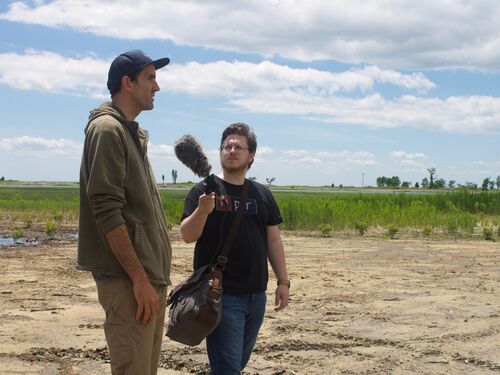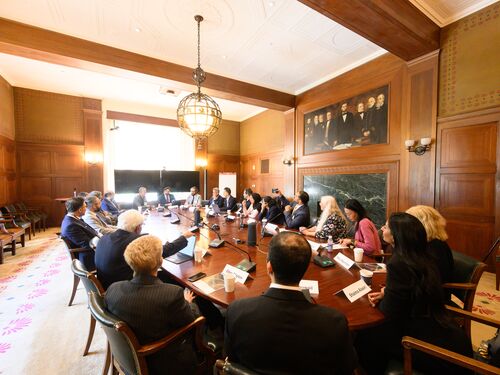Employing ‘Serious Gaming’ to Explore Challenges and Solutions in the Gulf of Mexico
Feature Story
By Maeghan Klinker
Last update March 6, 2023
While most people play games simply to have fun, gaming applications are serious business for many. “Serious gaming” is being used in areas that range from improving complex medical and business practices, for example, to helping to inform and develop Ukrainian military strategy in the war with Russia.
“Serious gaming solves problems that other things can’t solve,” said Jeremy Sepinsky, lead wargame designer at CNA, an independent, nonprofit organization that designs, facilitates, and analyzes wargames for agencies and military commands. “Gaming is a tool to leverage the inherent creativity and inconsistency of human beings. When human beings are part of the question, you need a tool that takes that inherent uncertainty into account, and gaming is the only tool I know of that does that.”
Among the users of serious games is the National Academies’ Gulf Research Program, which convenes stakeholders across government, industry, academia, and Gulf communities to explore challenges facing the Gulf region. To date, the GRP has held three serious games to delve into oil spill preparedness, resilient infrastructure, and the nation’s energy transition.
“The Gulf region is facing numerous complex challenges that require innovative approaches and innovative solutions,” said Lauren Alexander Augustine, executive director of the Gulf Research Program. “The GRP is exploring serious gaming as part of its strategy to bring together diverse perspectives to help find these solutions.”
The games used by the GRP have taken a variety of forms. For example, the Offshore Situation Room, held as a virtual event in June 2021 due to the COVID-19 pandemic, allowed participants to explore the possible impacts of an offshore oil disaster in the Gulf of Mexico and capabilities for preventing and responding to such a spill. The game also highlighted how changes in policy, response, resilience, and restoration efforts may affect outcomes of a major offshore incident.
The Investing in Resilient Infrastructure game explored possible ways to prioritize infrastructure investments across sectors, anchored in the Gulf region energy industry. Using two scenarios — a hurricane and a protracted oil spill — participants discussed infrastructure vulnerabilities and identified and prioritized projects and investments to reduce those vulnerabilities.
Navigating the Energy Transition was a game built on a similar framework of two scenarios. The first, referred to as “The Path to Net-Zero,” assumed the U.S. had met its goal of 100% clean electricity by 2050. Participants were asked to identify various impacts this transition would have on local communities, governments, academia, and industry. They then considered an alternative scenario referred to as “Steadying the Transition,” which assumed that no strict government regulation had been put in place and that the goal of net-zero by 2050 had not been reached, but that the Gulf continued to play a significant role in supplying natural gas, and to a lesser extent, oil to an economy gradually reducing carbon emissions.
Providing these hypothetical scenarios encourages productive discussions among participants and creative problem-solving revolving around complex issues.
“There’s not a board, there’s not a rule book, there’s not what we call ‘victory conditions,’” said wargame designer Sepinsky, who facilitated GRP’s energy transition game. “We build analytic games about learning something rather than winning, finding ways to share and leverage the expertise of everyone in the room. The game is a process to analytically produce a product at the end of the experience rather than a competition to achieve a goal.”
The product generated is an analysis of the results categorizing key issues related to the topic as identified by the expert participants. This analysis informs the GRP’s strategy for supporting lasting change in the Gulf region while convening stakeholders from various groups to participate in the game.
“These games bring out a level of engagement unique from other workshops,” said James Price, program officer for GRP’s Board on Gulf Offshore Energy Safety. “CNA does a fantastic job facilitating these events and helping us analyze the results to identify key issues which inform the GRP’s programs.”
The games also align with the GRP’s strategic objective of building partnerships and expanding networks by facilitating connections between participants.
“By sparking ideas and forming new connections, these games help us to examine challenges in a new light,” said Augustine. “The serious games bring an element of fun to this work, force partnerships and teamwork, and help the GRP build cohesive teams. Together — these teams with us and with each other — we imagine what a resilient and sustainable future looks like for the Gulf Coast.”
More like this
Discover
Events
Right Now & Next Up
Stay in the loop with can’t-miss sessions, live events, and activities happening over the next two days.
NAS Building Guided Tours Available!
Participate in a one-hour guided tour of the historic National Academy of Sciences building, highlighting its distinctive architecture, renowned artwork, and the intersection of art, science, and culture.



